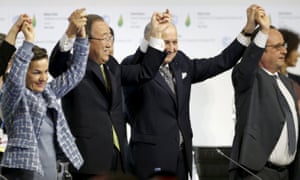Paris climate deal might just be enough to start turning the tide on global warming
They would be “making history”, it was a “moment of truth”, it would go down as “a major date in the history of mankind”, there would never be another chance, the future of the world, quite literally, depended upon the decision they were about to make that moment. And then they broke for lunch. The meeting was inFrance, after all.
Well-fed, and aware that the deal was already being hailed around the world, despite not yet being actually done, the negotiators did reconvene later in the day.
But then – even as everyone had started celebrating – the agreement almost fell apart.
Somehow, the word “should” had been replaced with “shall” in a crucial part of the text, which created the possibility of a legal obligation and a very big problem for the Americans, who may then have had to take the agreement to Congress, where it would be defeated./.../
********************
From Claudio Schuftan
US, UK and others accused of ‘cynical’ ploy in response to developing countries’ firm stance on holding rich nations accountable for climate change damage.
Strongly held positions are frequently traded away or dropped by governments out of necessity in the last hours of international negotiations. But the removal of all reference to human rights in the final draft of the Paris climate agreement has dismayed leaders of nearly all the myriad civil society groups pressing for a strong outcome.
According to observers, Britain, Norway, the US and a small group of developed countries actively blocked inclusion of any mention of human rights in the text in retaliation for developing countries’ refusal to give ground on a part of the text called “loss and damage”. This holds rich countries accountable for irreversible damage done by climate change.
Groups representing development, environment, young people, indigenous peoples, trade unions, women, and others, have all reacted angrily, calling the move “highly contentious” and “cynical” because it deliberately penalised the most vulnerable.
“The loss of the human rights language from article 2 is extremely disappointing and follows the earlier loss of references to gender equality and just transition to a clean economy,” said Helen Szoke, Oxfam Australia’s executive director.
“It appears to be a cynical and manipulative negotiating ploy, designed only to leverage the political commitment the leaders of many developing countries have made to returning with provisions on ‘loss and damage’,” said one observer.
“Combating climate change and helping communities adapt is about protecting rights, of children, particularly the poorest and most disadvantaged, and other vulnerable groups, including migrants, indigenous peoples, and women,” said Joni Pegram, climate change policy advisor at Unicef UK.
***************************************
Time
http://time.com/4146830/cop-21-paris-agreement-climate/?xid=newsletter-brief
No comments:
Post a Comment